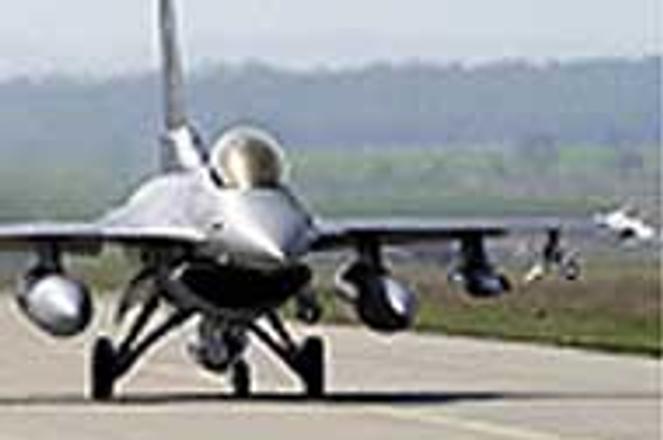Some 300 American soldiers and their F-16 Falcon fighter jets landed at Kuchyňa airbase on April 1 as part of a NATO training programme with Slovakia. But before Slovakia is admitted into the alliance, strict rules monitoring the confidentiality of top-secret state information must be passed by the Slovak government.photo: TASR
In order to prepare the country for NATO membership, high-ranking Slovak officials with access to secret information will soon have to answer some tough questions: "Do you owe anyone more than 100,000 Slovak crowns?", "Have any special intelligence agencies [such as the SIS, KGB, or the CIA] ever held a special interest in you or have you ever had any contact with members of these agencies?", "Where have you stayed abroad and why?"
Questions like these will soon be presented to Slovak officials in the form of a questionaire to be created by the National Security Office, a body which will monitor the protection of confidential information at Slovak ministries and state bodies. The security office will be created from the existing Information Security Department at the Interior Ministry.
Slovak Defense Minister Pavol Kanis said that upgrading the country's ability to protect confidential information would be the biggest hurdle for Slovakia to overcome in meeting its NATO accession goals. "It's our biggest problem and it will cost us billions of Slovak crowns," Kanis said on March 31. "It means we will have to test all our people, buy new security systems, new expensive communication links, new computer systems... we must create a whole new institution. That's why I'm talking about billions."
Need for security
The importance of secrecy was outlined in the so-called Membership Action Plan, an official NATO document dealing with the upcoming expansion of the alliance that was approved at the Washington NATO Summit in April 1999. NATO officials said that secrecy was important for the security of all countries in the alliance.
"NATO is a peacetime alliance of countries, but at times it's also a wartime alliance," a NATO official said on April 4. "That's why all allies must be sure that all confidential information is exchanged in a proper manner."
Foreign Affairs Minister Eduard Kukan said on March 21 that the government would like to see a NATO-compliant secrecy law approved this year, or 2002 by the latest. "We want to solve this problem before the end of our government's term," Kukan said.
Slovak Interior Ministry experts have been preparing the draft of the law since immediately after the April NATO summit. According to Ondrej Szabo, the Interior Ministry's Information Security Department head, Slovakia will have to begin by changing how it classifies confidential information.
"The Slovak system currently uses only two categories: secret and top secret," he said on April 3. "But according to NATO standards, we have to start using four categories: restricted, confidential, secret and top secret [in ascending order of importance]. After we finish our improvements, Slovak information will be safer."
Szabo said that his Information Security Department had already begun the transformation process, and that as the newly-formed National Security Office, the body would begin testing officials as soon as the law was passed. Testers would be kept busy, he added, because more than 2000 Slovak officials have already been slated for examination during the two years after the law is approved by the Slovak parliament.
"Approximately 150 to 200 people will be employed at the National Security Office," he said. "Of those, approximately 30 will work in the special testing section [which will be responsible for checking the security of Slovak officials based on their answers in the new questionaire]."
The National Security Office will begin operations as an institute within the Interior Ministry as soon as the law is passed. Although the security office has not yet been officially established, the government has already allocated 20 million Slovak crowns ($465,000) this year so the office can begin the transformation process. Eventually, the National Security Office would become an independent government body.
Szabo said the National Security Office would be established as the lone institution holding ultimate power over the monitoring of confidentiality. Although some government officials had earlier suggested that more than one top body would be created, Szabo said that NATO membership demanded the new security office be alone. "NATO wants only one partner because they want to know exactly who their partner is," Szabo said.
No final list has been prepared of Slovak government officials who will have to pass the new examinations, but Szabo said it would likely include all officials with access to secret information. The questionnaires will be accessible to the public after the law is approved, perhaps as early as later this year.


